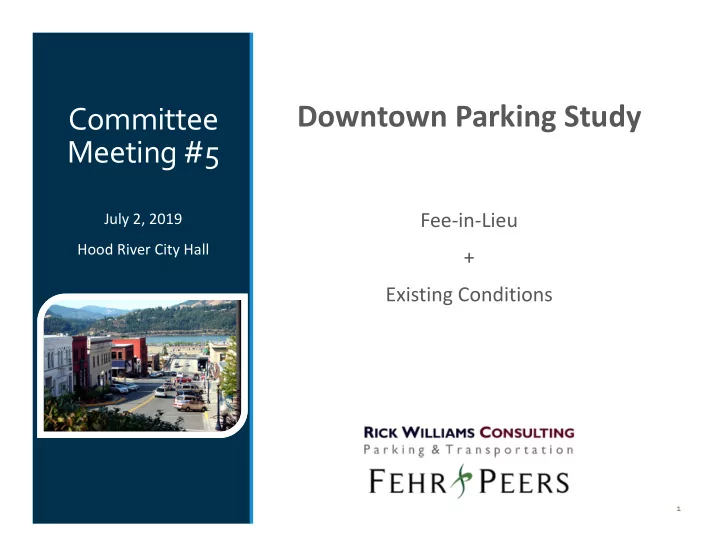

Downtown Parking Study Committee Meeting #5 Fee‐in‐Lieu July 2, 2019 Hood River City Hall + Existing Conditions 1
Agenda 1. Introductions 2. Approve Meeting #4 Notes Rick Williams 3. Fee‐in‐Lieu (WP #5) Rick Williams 4. Preview: Existing Conditions (WP #6) Pete Collins 5. Update: Public Outreach Rick Williams 6. Next Steps July 9, 2019 Open House August 6, 2019 Ad Hoc Committee 2
Approve Meeting #4 Notes Refer to Handout 3
Fee ‐ in ‐ Lieu Refer to Handout 4
Key Purpose Fees‐in‐lieu allows a new or intensified development to buy out of a Fee ‐ in ‐ Lieu requirement to provide a minimum number of parking stalls. Fees paid by the developer are used by the City to fund development of new public parking facilities. A fee‐in‐lieu rate is generally set at a level less than the cost for a developer to provide on‐site parking. Fees‐in‐lieu are generally calibrated to the level of commitment the City makes to the payer for access to an off‐site parking supply: an “entitlement” to parking access. 5
Benefits Encourages developers to consider “right sizing” their parking supply. Fee ‐ in ‐ Lieu Encourages developers to explore shared‐use opportunities in reasonable proximity to their development site. Can reduce development costs, making projects more feasible. Provides a revenue source that the City can invest in a consolidated parking development plan. 6
Current Program 2019/2020 Fee Schedule Type of Use Fee‐in‐lieu Fee ‐ in ‐ Lieu Residential $22,088 per space (first 2/3rd) + $2,142 per space (last 1/3 rd ) Commercial $1,226 per space Industrial $1,226 per space Appears to favor commercial/industrial? Would suggest disincentive to residential? Would suggest plan for other funds to accommodate new supply for commercial/industrial? Per 17.024.010 B, the City directs funds collected from fee‐in‐ lieu payments to be deposited “in a dedicated fund for the development and provision of public parking facilities.” 7
Case Studies Bend, OR: $26,000/per stall. The fee goes into a fund designated “only for the planning, acquisition, development, and maintenance of off‐street parking facilitates located in and/or Fee ‐ in ‐ Lieu adjacent to the CBD.” Corvallis, OR: $10,560/per stall. Funds to be used by the City to construct publicly available parking spaces. “It should be recognized that Fee‐in‐Lieu Parking Program fees may construct spaces that do not directly serve the parcels from which the fee was collected .” Tualatin, OR: $3,500 per stall required. Tualatin ’s fee‐in‐lieu program (Chapter 3.3) only applies to the Central Business District. 8
Hood River: Issues to Consider Clarity on the strategic intent for use of the fees collected. City role and responsibility. Fee ‐ in ‐ Lieu Are there expectations of an access entitlement that may or may not be granted to fee payers? A consistent and market‐based methodology for calculating fees. Planning for use of fees collected with other funding sources to support new supply. 9
Existing Conditions Refer to White Paper #6 10
Publicly Owned Supply 11
Financial History Gross revenue between $600,000 and $700,000 annually between FY 2010/11 and FY 2015/16. Revenue has shown a strong upward trend to FY 2016/17, exceeding $900,000. Revenues dropped slightly to just under $900,000 in FY 2017/2018 (the last fully completed fiscal year). Expense growth has been constant (within normal growth range). 12
Revenue History 0% 11% 0% 19% 70% Meters Enforcement Monthly Permits Work Permits Misc Program Revenue Average Annual Percentage (2010‐2018) Meters $4,019,044 $502,380 70.0% Enforcement $1,066,796 $133,349 18.6% Monthly Permits $611,413 $76,426 10.6% Work Permits $24,154 $3,019 0.4% Misc. $22,744 $2,843 0.4% Total $5,744,152 $718,019 13
Expense History 4% 0% 5% 9% 15% 67% Salary & Wages Office Operations Infrastructure Contract services Bank Fees Misc Program Expenditures Average Annual Percentage (2010‐2018) Salary & Wages $1,450,346 $181,293 67.0% Office Operations $317,780 $39,722 14.7% Infrastructure $188,156 $23,519 8.7% Contract Services $105,657 $13,207 4.9% Bank Fees $99,615 $12,451 4.6% Misc. $2,721 $340 0.1% Total $2,164,277 $270,534 14
Key Findings ‐ Financial Existing The parking system generates surplus Conditions revenue over expenses. Based on the past eight years, the downtown parking system has generated net revenues of $3,579,875; about $447,484 each year. The system is netting approximately $478 per stall per year, or $39.84 per stall per month. How all or a portion of future net revenues are allocated back into the City’s financial program should be discussed. 15
General Observations Existing Payment Technology ‐ 72% of pay‐to‐park stalls Conditions are coin only. This puts users at risk of receiving a citation or shortening their visit (and spending opportunity) in the downtown. Wayfinding. It is difficult to determine where off‐ street parking options are available. Lot identification . Individual City‐owned lots are not visually identified with a common brand and/or lot identifier. Pricing. It does not appear at this time that on‐ or off‐street pricing is tied to parking demand. Financial reporting. Revenue/expenditure reporting for enforcement wages and salary (expense) and citations issued (revenue) should be called out as separate line items. 16
What’s Next? Existing Strategy Development – Couple 2018 data with Conditions Guiding Principles and observations of existing conditions to propose management strategies. Policy/Code Development. Propose revisions to policy and code to ensure efficient parking system and supportive development environment. Financial System . Propose revisions to financial reporting to support future decision‐making. Pricing. Propose policy and procedure for setting and managing rates (on‐street, off‐ street, permits). New technologies/communications systems. Propose best practice systems to support all strategies. 17
Meeting #6: August 1, 2019 Existing Conditions Detail Next Steps New Technologies (WP #7) Public Outreach Update What more would the Committee like to see? 18
THANK YOU! 19
Recommend
More recommend